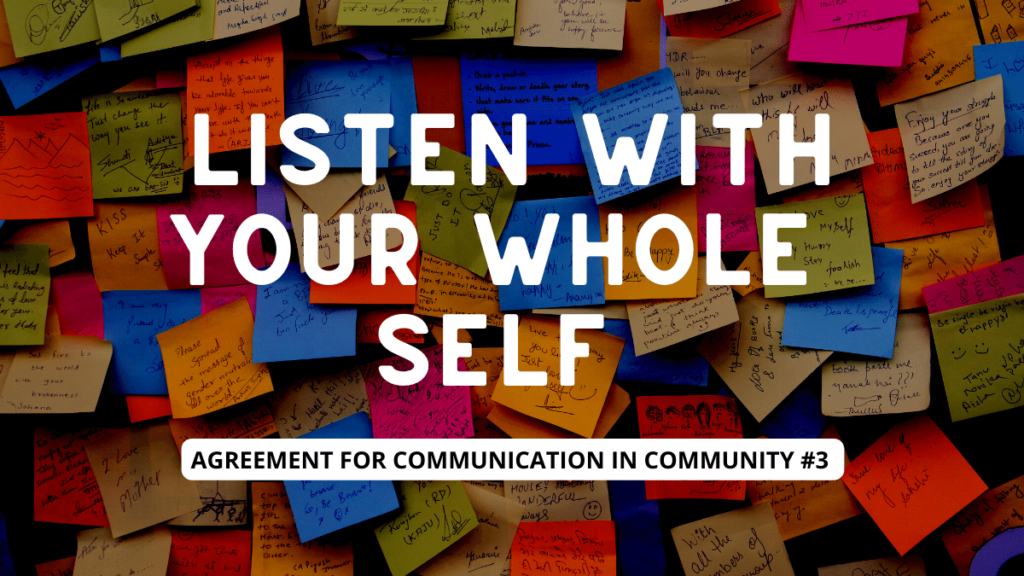
AGRREMENT #3: LISTEN WITH YOUR WHOLE SELF
When you are listening to another person share their thoughts, feelings, opinions or experiences, suspend your own – to the extent possible, push “pause” on your thought stream…
Sarah: Helen, what is your experience of deep listening as a member of Grace Church?
Helen: It is essential for the listener to care and attend to another person with her whole self, especially if the speaker is in difficulty and needs help to move through whatever they are dealing with, suffering with, or struggling with.
Sarah: What stands out to you as the most important phrase in this agreement to “listen with your whole self”?
Helen: “Share their thoughts” and “suspend your own” is the most important piece.
A speaker can only really be seen and deeply heard if you listen with full attention and value the words they are speaking, even more than I value my own ideas or perspectives.
Over the years, as people have stopped by to talk about whatever is on their minds and hearts, I am realizing that they only way that I have found that listening gives them any kind of relief or help is when it allows them to find a quiet space within themselves to work out whatever they is distressing. I think because I provided that space for them to really be heard and then listen to the wisdom of their own heart, the place from which Holy Spirit speaks with love and tenderness, that they were able to uncover what needed understanding, that they were able to listen deeply, too.
Sarah: What is hard about listening with your whole self? What gets in the way?
Helen: Well, I think it’s when the listener does not pay close attention.
Sarah: Why is it hard to pay close attention to another person sometimes?
Helen: I think it is a fault of the listener…the listener has to consciously choose to be totally present to the speaker. It is essential that the listener give every ounce of her attention and receptivity to the person that is speaking.
Sarah: I want to say a word about reception. I like that you used that word. If you walk into an office space and you stand at the “reception desk” with your request or your attempt to connect, and there is no one there at the desk, then no one receives you. If we listen without the ability to receive – and I mean really clear our own decks and become deeply curious and attentive to another person – then nothing they say gets “across the desk.” If there is no receptivity, then there is no exchange, no movement, no transformation. And that starts with the listener. All we have to do is receive. It is harder to do this than we think!
Helen: Yes! The speaker needs to go through whatever he is going through in that moment. And sometimes, after listening deeply, you find there is nothing to say. What happens, and it has happened before, is that a breakthrough can come through for the speaker. A release. Of what is really hurting them, bothering them, whatever it is. And they are able to release it.
Sarah: They discover their own wisdom then, yes? And find that the grace of the presence of God was theirs all along. Kind of like when Dorothy realized she herself had the power to go home…she was wearing the ruby slippers. She just didn’t know what they were for, or how to use them. She had to discover a lot of things about herself first.
Helen: I like that! A speaker can only uncover their own wisdom, and the presence of the Holy Spirit, when he has felt welcome and acceptance and caring.
Sarah: We cannot truly offer that kind of welcome when we are still trying to be smart or clever or fix it or use our words like a magic wand that solves someone’s problem for them. Listening with your whole self creates a container for another person to uncover what is hidden and bring it to the light, ask for help, receive just what you need, and move forward really knowing you are connected, you are beloved, you are not alone.
St. Peter Claver, a Jesuit (I was educated by the Jesuits!) famously said, “If you look for God in all things, you will find God by your side.” I am reminded of this by our conversation today. I am understanding as we talk that “listening with your whole self” is a way of looking for God on behalf of another person and giving that person the opportunity to be surprised by God, to be surprised by grace. And find God by your side.
Helen: I have this quote from Bishop Steven Charleston, who wrote the book Rev. Amy is using for her lenten reflections this season. He said, “Hope is the match, prayer is the fire. If you know someone who needs a little help in getting a prayer life going, ask them if they ever hope for something. It’s a safe bet that they do. And all the time. Humans are hopeful creatures. We are in an almost daily state of hope. We hope it won’t rain. We hope we get better. We hope we win. Hope is a constant for us in our emotional matrix. Prayer is simply hope captured. Rather than a fleeting wish, through prayer hope becomes a focused intention. Prayers mature hope by allowing God to light a fire.”
I think listening deeply and then engaging what you hear in prayer with another is a profound act of hope and is what we are here for when we listen to one another. Prayer with another is my favorite way to listen with my whole self.
Sarah: What we need is here!

Thank you for this beautiful conversation that is truly life giving and affirming. I love that ‘prayer is hope captured’. Amen
Thanks Marilyn! It was such fun to have this conversation. We were thinking we should have recorded the audio for posterity. We appreciate the kind words, both Helen and myself.
Thank you for sharing this wonderful and enlightening conversation. I loved “hope is the match, prayer is the fire.”